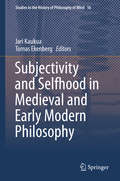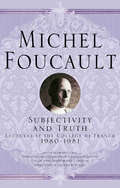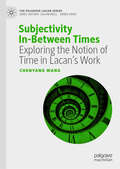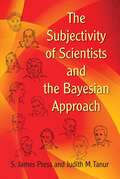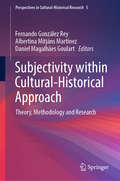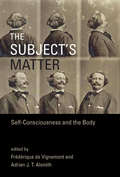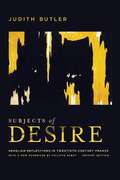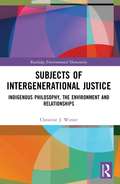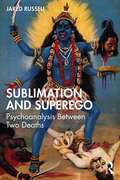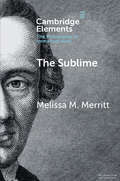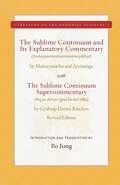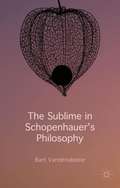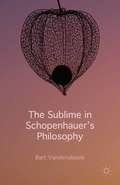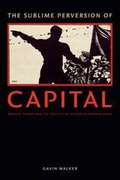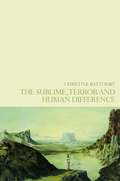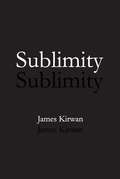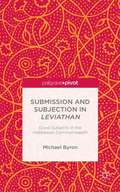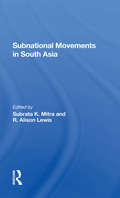- Table View
- List View
Subjectivity and Selfhood in Medieval and Early Modern Philosophy
by Jari Kaukua Tomas EkenbergThis book is a collection of studies on topics related to subjectivity and selfhood in medieval and early modern philosophy. The individual contributions approach the theme from a number of angles varying from cognitive and moral psychology to metaphysics and epistemology. Instead of a complete overview on the historical period, the book provides detailed glimpses into some of the most important figures of the period, such as Augustine, Avicenna, Aquinas, Descartes, Spinoza, Leibniz and Hume. The questions addressed include the ethical problems of the location of one's true self and the proper distribution of labour between desire, passion and reason, and the psychological tasks of accounting for subjective experience and self-knowledge and determining different types of self-awareness.
Subjectivity and Selfhood in Medieval and Early Modern Philosophy (Studies in the History of Philosophy of Mind #16)
by Jari Kaukua Tomas EkenbergThis book is a collection of studies on topics related to subjectivity and selfhood in medieval and early modern philosophy. The individual contributions approach the theme from a number of angles varying from cognitive and moral psychology to metaphysics and epistemology. Instead of a complete overview on the historical period, the book provides detailed glimpses into some of the most important figures of the period, such as Augustine, Avicenna, Aquinas, Descartes, Spinoza, Leibniz and Hume. The questions addressed include the ethical problems of the location of one's true self and the proper distribution of labour between desire, passion and reason, and the psychological tasks of accounting for subjective experience and self-knowledge and determining different types of self-awareness.
Subjectivity and Truth: Lectures at the Collège de France, 1980-1981
by Michel Foucault“The working hypothesis is this: it is true that sexuality as experience is obviously not independent of codes and systems of prohibitions, but it needs to be recalled straightaway that these codes are astonishingly stable, continuous, and slow to change. It needs to be recalled also that the way in which they are observed or transgressed also seems to be very stable and very repetitive. On the other hand, the point of historical mobility, what no doubt change most often, what are most fragile, are modalities of experience.” - Michel Foucault In 1981 Foucault delivered a course of lectures which marked a decisive reorientation in his thought and of the project of a History of Sexuality outlined in 1976. It was in these lectures that arts of living became the focal point around which he developed a new way of thinking about subjectivity. It was also the moment when Foucault problematized a conception of ethics understood as the patient elaboration of a relationship of self to self. It was the study of the sexual experience of the Ancients that made these new conceptual developments possible. Within this framework, Foucault examined medical writings, tracts on marriage, the philosophy of love, or the prognostic value of erotic dreams, for evidence of a structuration of the subject in his relationship to pleasures (aphrodisia) which is prior to the modern construction of a science of sexuality as well as to the Christian fearful obsession with the flesh. What was actually at stake was establishing that the imposition of a scrupulous and interminable hermeneutics of desire was the invention of Christianity. But to do this it was necessary to establish the irreducible specificity of ancient techniques of self. In these lectures, which clearly foreshadow The Use of Pleasures and The Care of Self, Foucault examines the Greek subordination of gender differences to the primacy of an opposition between active and passive, as well as the development by Imperial stoicism of a model of the conjugal bond which advocates unwavering fidelity and shared feelings and which leads to the disqualification of homosexuality.
Subjectivity, Gender and the Struggle for Recognition
by Paddy McqueenIn this book Paddy McQueen examines the role that 'recognition' plays in our struggles to construct an identity and to make sense of ourselves as gendered beings. It analyses how such struggles for gender recognition are shaped by social discourses and power relations, and considers how feminism can best respond to these issues.
Subjectivity In-Between Times: Exploring the Notion of Time in Lacan’s Work (The Palgrave Lacan Series)
by Chenyang WangThis book is the first to systematically investigate how the notion of time is conceptualised in Jacques Lacan’s work. Through a careful examination of Lacan’s various presentations of time, Chenyang Wang argues that this notion is key to a comprehension of Lacan’s psychoanalytic thinking, and in particular to the way in which he theorises subjectivity. This book demonstrates that time is approached by Lacan not only as consciously experienced, but also as pre-reflectively embodied and symbolically generated. In an analysis that begins with Lacan’s “Logical Time” essay, Chenyang Wang articulates three temporal registers that correspond to Lacan's Real-Symbolic-Imaginary triad and also demonstrates how Lacan’s elaboration of other major themes including consciousness, body, language, desire and sexuality is informed by his original perspectives on time. Filling a significant gap in contemporary Lacanian studies, this book will provide essential reading for students and scholars of psychoanalytic theory, continental philosophy and critical theory.
Subjectivity in the Twenty-First Century
by Romin W. TafarodiWhat is it like to be a person today? To think, feel, and act as an individual in a time of accelerated social, cultural, technological, and political change? This question is inspired by the double meaning of subjectivity as both the 'first-personness' of consciousness (being a subject of experience) and the conditioning of that consciousness within society (being subject to power, authority, or influence). The contributors to this volume explore the perils and promise of the self in today's world. Their shared aim is to describe where we stand and what is at stake as we move ahead in the twenty-first century. They do so by interrogating the historical moment as a predicament of the subject. Their shared focus is on subjectivity as a dialectic of self and other, or individual and society, and how the defining tensions of subjectivity are reflected in contemporary forms of individualism, identity, autonomy, social connection, and political consciousness.
The Subjectivity of Scientists and the Bayesian Approach (Dover Books on Mathematics #775)
by S. James Press Judith M. Tanur"Press and Tanur argue that subjectivity has not only played a significant role in the advancement of science but that science will advance more rapidly if the modern methods of Bayesian statistical analysis replace some of the more classical twentieth-century methods." -- SciTech Book News."An insightful work." - Choice."Compilation of interesting popular problems ... this book is fascinating." -- Short Book Reviews, International Statistical Institute.Subjectivity - including intuition, hunches, and personal beliefs - has played a key role in scientific discovery. This intriguing book illustrates subjective influences on scientific progress with historical accounts and biographical sketches of more than a dozen luminaries, including Aristotle, Galileo, Newton, Darwin, Pasteur, Freud, Einstein, Margaret Mead, and others. The treatment also offers a detailed examination of the modern Bayesian approach to data analysis, with references to the Bayesian theoretical and applied literature. Suitable for lay readers as well as science specialists, this survey will also appeal to historians of science and those interested in knowing more about the Bayesian approach.
Subjectivity within Cultural-Historical Approach
by Fernando González Rey Albertina Mitjáns Martínez Daniel Magalhães GoulartThis book offers a theoretical and epistemological-methodological framework as an alternative approach to the instrumental-descriptive methodology that has prevailed in psychology to date. It discusses the differences between the proposed approach and other theoretical and methodological positions, such as discourse analysis, phenomenology and hermeneutics. Further, it puts forward a proposal that allows the demands of studying subjectivity to be addressed from a cultural-historical standpoint. The book mainly highlights case studies that have been conducted in various countries, and which employ or depart from the theoretical, epistemological and methodological proposals that guide this book. The research discussed here introduces readers to new discussions on theoretical and methodological issues in subjectivity that have increasingly attracted interest.
The Subject's Matter: Self-Consciousness and the Body (Representation and Mind series)
by Frédérique De Vignemont Adrian J. T. AlsmithAn interdisciplinary and comprehensive treatment of bodily self-consciousness, considering representation of the body, the sense of bodily ownership, and representation of the self.The body may be the object we know the best. It is the only object from which we constantly receive a flow of information through sight and touch; and it is the only object we can experience from the inside, through our proprioceptive, vestibular, and visceral senses. Yet there have been very few books that have attempted to consolidate our understanding of the body as it figures in our experience and self-awareness. This volume offers an interdisciplinary and comprehensive treatment of bodily self-awareness, the first book to do so since the landmark 1995 collection The Body and the Self, edited by José Bermúdez, Naomi Eilan, and Anthony Marcel (MIT Press). Since 1995, the study of the body in such psychological disciplines as cognitive psychology, cognitive neuroscience, psychiatry, and neuropsychology has advanced dramatically, accompanied by a resurgence of philosophical interest in the significance of the body in our mental life. The sixteen specially commissioned essays in this book reflect the advances in these fields. The book is divided into three parts, each part covering a topic central to an explanation of bodily self-awareness: representation of the body; the sense of bodily ownership; and representation of the self.ContributorsAdrian Alsmith, Brianna Beck, José Luis Bermúdez, Anna Berti, Alexandre Billon, Andrew J. Bremner, Lucilla Cardinali, Tony Cheng, Frédérique de Vignemont, Francesca Fardo, Alessandro Farnè, Carlotta Fossataro, Shaun Gallagher, Francesca Garbarini, Patrick Haggard, Jakob Hohwy, Matthew R. Longo, Tamar Makin, Marie Martel, Melvin Mezue, John Michael, Christopher Peacocke, Lorenzo Pia, Louise Richardson, Alice C. Roy, Manos Tsakiris, Hong Yu Wong
Subjects of Desire: Hegelian Reflections in Twentieth-Century France
by Judith ButlerThis classic work by one of the most important philosophers and critics of our time charts the genesis and trajectory of the desiring subject from Hegel's formulation in Phenomenology of Spirit to its appropriation by Kojève, Hyppolite, Sartre, Lacan, Deleuze, and Foucault. Judith Butler plots the French reception of Hegel and the successive challenges waged against his metaphysics and view of the subject, all while revealing ambiguities within his position. The result is a sophisticated reconsideration of the post-Hegelian tradition that has predominated in modern French thought, and her study remains a provocative and timely intervention in contemporary debates over the unconscious, the powers of subjection, and the subject.
Subjects of Intergenerational Justice: Indigenous Philosophy, the Environment and Relationships (Routledge Environmental Humanities)
by Christine J. WinterThis book challenges mainstream Western IEJ (intergenerational environmental justice) in a manner that privileges indigenous philosophies and highlights the value these philosophies have for solving global environmental problems. Divided into three parts, the book begins by examining the framing of Western liberal environmental, intergenerational and indigenous justice theory and reviews decolonial theory. Using contemporary case studies drawn from the courts, film, biography and protests actions, the second part explores contemporary Māori and Aboriginal experiences of values-conflict in encounters with politics and law. It demonstrates the deep ontological rifts between the philosophies that inform Māori and Aboriginal intergenerational justice (IJ) and those of the West that underpin the politics and law of these two settler states. Existing Western IEJ theories, across distributional, communitarian, human rights based and the capabilities approach to IJ, are tested against obligations and duties of specific Māori and Aboriginal iwi and clans. Finally, in the third part, it explores the ways we relate to time and across generations to create regenerative IJ. Challenging the previous understanding of the conceptualization of time, it posits that it is in how we relate—human to human, human to nonhuman, nonhuman to human—that robust conceptualization of IEJ emerges. This volume presents an imagining of IEJ which accounts for indigenous norms on indigenous terms and explores how this might be applied in national and international responses to climate change and environmental degradation. Demonstrating how assumptions in mainstream justice theory continue to colonise indigenous people and render indigenous knowledge invisible, this book will be of great interest to students and scholars of environmental and intergenerational philosophy, political theory, indigenous studies and decolonial studies, and environmental humanities more broadly.
Sublimation and Superego: Psychoanalysis Between Two Deaths
by Jared RussellThis book integrates a thinking about dilemmas faced in the context of the clinical practice of psychoanalysis today, with contemporary social and political concerns specific to the age of the global consumer marketplace. Beginning with an analysis of the fate of the concept of sublimation in Freud’s work, and its relationship to the elaboration of the concept of the superego in 1923, Jared Russell examines how these concepts provide a lever for integrating psychoanalytic thinking with topics of urgent social concern, beyond the critique of ideology. Taking up topics such as the experience of time, addiction to consumption, and the general consequences of the insinuation of digital technologies at increasingly earlier stages in human development—and thinking these through the lens of what the clinical practice of psychoanalysis teaches us about intimate human relatedness—the book addresses how a philosophically oriented approach to psychoanalysis can illuminate our response to the problems of everyday life under conditions of late capitalism. Drawing on a diverse range of authors such as Freud, Heidegger, Hans Loewald, Christopher Bollas, Lacan, Deleuze and Bernard Stiegler, it is argued that the concepts of sublimation and of the superego must be reinvented with regard to both clinical and critical discourse today if psychoanalysis is to remain relevant to the major issues we face, both individually and collectively, in the twenty-first century. Sublimation and Superego: Psychoanalysis Between Two Deaths stages a unique encounter between philosophy, critical theory and clinical practice that will be of interest to psychoanalysts, scholars of twentieth-century continental philosophy, critical social theorists and mental health practitioners.
The Sublime
by Timothy M. Costelloe"This volume offers readers a unique and comprehensive overview of theoretical perspectives on "the sublime," the singular aesthetic response elicited by phenomena that move viewers by transcending and overwhelming them. The book consists of an editor's introduction and fifteen chapters written from a variety of disciplinary perspectives. Part One examines philosophical approaches advanced historically to account for the phenomenon, beginning with Longinus, moving through eighteenth and nineteenth century writers in Britain, France, and Germany, and concluding with developments in contemporary continental philosophy. Part Two explores the sublime with respect to particular disciplines and areas of study, including Dutch literature, early modern America, the environment, religion, British Romanticism, the fine arts, and architecture. Each chapter is both accessible for nonspecialists and offers an original contribution to its respective field of inquiry"--
The Sublime (Elements in the Philosophy of Immanuel Kant)
by Melissa McBay MerrittThis Element considers Kant's account of the sublime in the context of his predecessors both in the Anglophone and German rationalist traditions. Since Kant says with evident endorsement that 'we call sublime that which is absolutely great' (Critique of the Power of Judgment, 5:248) and nothing in nature can in fact be absolutely great (it can only figure as such, in certain presentations), Kant concludes that strictly speaking what is sublime can only be the human calling (Bestimmung) to perfect our rational capacity according to the standard of virtue that is thought through the moral law. The Element takes account of the difference between respect and admiration as the two main varieties of sublime feeling, and concludes by considering the role of Stoicism in Kant's account of the sublime, particularly through the channel of Seneca.
The Sublime Continuum and Its Explanatory Commentary: With the Sublime Continuum Supercommentary - Revised Edition (Treasury of the Buddhist Sciences)
by Bo JiangExplore an in-depth explanation of buddha nature and self-emptiness.The original Sublime Continuum Explanatory Commentary was written by Noble Asanga to explain the verses received from the bodhisattva Maitreya in the late fourth century CE in northern India. Here it is introduced and presented in an original translation from Sanskrit and Tibetan, with the translation of an extensive Tibetan Supercommentary by Gyaltsap Darma Rinchen (1364–1432), whose work closely followed the view of his teacher, Tsong Khapa (1357–1419). Contemporary scholars have widely misunderstood the Buddhist Centrist (Madhyamaka) teaching of emptiness, or selflessness, as either a form of nihilism or a radical skepticism. Yet Buddhist philosophers from Nagarjuna on have shown that the negation of intrinsic reality, when accurately understood, affirms the supreme value of relative realities. Gyaltsap Darma Rinchen, in his Supercommentary, elucidates a highly positive theory of the buddha nature, showing how the wisdom of emptiness empowers the compassionate life of the enlightened, as it is touched by its oneness with the truth body of all buddhas. With his clear study of Gyaltsap&’s insight and his original English translation, Bo Jiang completes his historic project of studying and presenting these works from Sanskrit and Tibetan in both Chinese and, now, English translations, in linked publications.
The Sublime in Antiquity
by James I. PorterCurrent understandings of the sublime are focused by a single word ('sublimity') and by a single author ('Longinus'). The sublime is not a word: it is a concept and an experience, or rather a whole range of ideas, meanings and experiences that are embedded in conceptual and experiential patterns. Once we train our sights on these patterns a radically different prospect on the sublime in antiquity comes to light, one that touches everything from its range of expressions to its dates of emergence, evolution, role in the cultures of antiquity as a whole, and later reception. This book is the first to outline an alternative account of the sublime in Greek and Roman poetry, philosophy, and the sciences, in addition to rhetoric and literary criticism. It offers new readings of Longinus without privileging him, but instead situates him within a much larger context of reflection on the sublime in antiquity.
The Sublime in Modern Philosophy
by Emily BradyIn The Sublime in Modern Philosophy: Aesthetics, Ethics, and Nature, Emily Brady takes a fresh look at the sublime and shows why it endures as a meaningful concept in contemporary philosophy. In a reassessment of historical approaches, the first part of the book identifies the scope and value of the sublime in eighteenth-century philosophy (with a focus on Kant), nineteenth-century philosophy and Romanticism, and early wilderness aesthetics. The second part examines the sublime's contemporary significance through its relationship to the arts; its position with respect to other aesthetic categories involving mixed or negative emotions, such as tragedy; and its place in environmental aesthetics and ethics. Far from being an outmoded concept, Brady argues that the sublime is a distinctive aesthetic category which reveals an important, if sometimes challenging, aesthetic-moral relationship with the natural world.
The Sublime in Schopenhauer’s Philosophy
by Bart VandenabeeleThe Sublime in Schopenhauer’s Philosophy.
The Sublime in Schopenhauer's Philosophy
by Bart VandenabeeleThe Sublime in Schopenhauer's Philosophy transforms our understanding of Schopenhauer's aesthetics and anthropology. Vandenabeele seeks ultimately to rework Schopenhauer's theory into a viable form so as to establish the sublime as a distinctive aesthetic category with a broader existential and metaphysical significance.
The Sublime Perversion of Capital: Marxist Theory and the Politics of History in Modern Japan
by Gavin WalkerIn The Sublime Perversion of Capital Gavin Walker examines the Japanese debate about capitalism between the 1920s and 1950s, using it as a "prehistory" to consider current discussions of uneven development and contemporary topics in Marxist theory and historiography. Walker locates the debate's culmination in the work of Uno Kozo, whose investigations into the development of capitalism and the commodification of labor power are essential for rethinking the national question in Marxist theory. Walker's analysis of Uno and the Japanese debate strips Marxist historiography of its Eurocentric focus, showing how Marxist thought was globalized from the start. In analyzing the little-heralded tradition of Japanese Marxist theory alongside Marx himself, Walker not only offers new insights into the transition to capitalism, the rise of globalization, and the relation between capital and the formation of the nation-state; he provides new ways to break Marxist theory's impasse with postcolonial studies and critical theory.
The Sublime Seneca
by Erik GundersonThis is an extended meditation on ethics in literature across the Senecan corpus. There are two chapters on the Moral Letters, asking how one is to read philosophy or how one can write about being. Moving from the Letters to the Natural Questions and Dialogues, Professor Gunderson explores how authorship works at the level both of the work and of the world, the ethics of seeing, and the question of how one can give up on the here and now and behold instead some other, better ethical sphere. Seneca's tragedies offer words of caution: desire might well subvert reason at its most profound level (Phaedra), or humanity's painful separation from the sublime might be part of some cruel divine plan (The Madness of Hercules). The book concludes by considering what, if anything, we are to make of Seneca's efforts to enlighten us.
The Sublime, Terror and Human Difference
by Christine BattersbyChristine Battersby is a leading thinker in the field of philosophy, gender studies and visual and literary aesthetics. In this important new work, she undertakes an exploration of the nature of the sublime, one of the most important topics in contemporary debates about modernity, politics and art. Through a compelling examination of terror, transcendence and the ‘other’ in key European philosophers and writers, Battersby articulates a radical ‘female sublime’. A central feature of The Sublime, Terror and Human Difference is its engagement with recent debates around ‘9/11’, race and Islam. Battersby shows how, since the eighteenth century, the pleasures of the sublime have been described in terms of the transcendence of terror. Linked to the ‘feminine’, the sublime was closed off to flesh-and-blood women, to ‘Orientals’ and to other supposedly ‘inferior’ human types. Engaging with Kant, Burke, the German Romantics, Nietzsche, Derrida, Lyotard, Irigaray and Arendt, as well as with women writers and artists, Battersby traces the history of these exclusions, while finding resources within the history of western culture for thinking human differences afresh The Sublime, Terror and Human Difference is essential reading for students of continental philosophy, gender studies, aesthetics, literary theory, visual culture, and race and social theory.
Sublimity: The Non-Rational and the Rational in the History of Aesthetics
by James KirwanSublimity addresses the nature of the sublime experience itself, and the function that experience has played, and continues to play, within aesthetic discourse. The book both updates and revises existing treatments of the sublime in the eighteenth century, examines its neglected role in the nineteenth century aesthetics, and analyzes the significance of the modifications the concept has undergone in order to serve the interests of contemporary aesthetics. The book thus offers the most comprehensive coverage of the history of the sublime available.
Submission and Subjection in Leviathan: Good Subjects in the Hobbesian Commonwealth
by Michael ByronLeviathan invests the sovereign with nearly absolute power, and that vast sovereign has drawn the reader's eye for 350 years. Yet Hobbes has much to say about subjects as well, and he articulates a normative conception of a good subject.
Subnational Movements In South Asia
by Robert C Oberst Subrata Mitra R. Alison Lewis R Alison LewisThe idea of the book initially emerged from a panel discussion at the Specialist Group on South Asia of the Political Studies Association, UK, in March 1993. On its tortuous path to publication, it has been enriched by critical comments from Sumit Ganguly, Vernon Hewitt, Iftikhar Malik, Gurharpal Singh and David Taylor. The volume has benefited fromSubrata Mitra's long association with the Centre for Indian Studies at the University of Hull and stimulating discussions with members of the Center for South Asian Studies and the Department of Political Science at the University of California, Berkeley, during his sabbatical term (spring 1994). The contributions, although completed by summer 1994, recognise the ongoing changes throughout the region.
